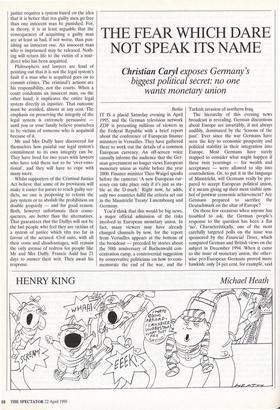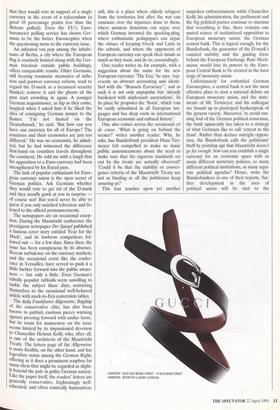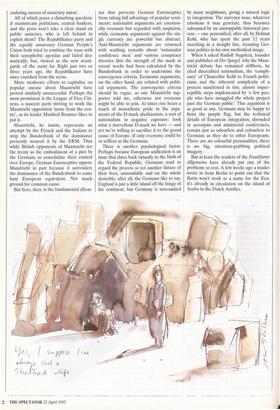THE FEAR WHICH DARE NOT SPEAK ITS NAME
Christian Caryl exposes Germany's
biggest political secret: no one wants monetary union
Berlin
IT IS a placid Saturday evening in April 1995, and the German television network ZDF is presenting millions of viewers in the Federal Republic with a brief report about the conference of European finance ministers in Versailles. They have gathered there to work out the details of a common European currency. An off-screen voice casually informs the audience that the Ger- man government no longer views European monetary union as viable before the year 2000. Finance minister Theo Waigel speaks before the cameras: 'A new European cur- rency can take place only if it's just as sta- ble as the D-mark.' Right now, he adds, only two countries fulfil the criteria set out in the Maastricht Treaty: Luxembourg and Germany.
You'd think that this would be big news, a major official admission of the risks involved in European monetary union. In fact, many viewers may have already changed channels by now, for the report from Versailles appears at the bottom of the broadcast — preceded by stories about the 50th anniversary of Buchenwald con- centration camp, a controversial suggestion by conservative politicians on how to com- memorate the end of the war, and the Turkish invasion of northern Iraq.
The hierarchy of this evening news broadcast is revealing. German discussions about Europe are invariably, if not always audibly, dominated by the 'lessons of the past'. Ever since the war Germans have seen the key to economic prosperity and political stability in their integration into Europe. Most Germans have rarely stopped to consider what might happen if these twin yearnings — for wealth and acceptance — were allowed to slip into contradiction. Or, to put it in the language of Maastricht, will Germans really be pre- pared to accept European political union, if it means giving up their most visible sym- bol of postwar economic achievement? Are Germans prepared to sacrifice the Deutschmark on the altar of Europe?
On those few occasions when anyone has troubled to ask, the German people's response to the question has been a flat 'no'. Characteristically, one of the most carefully targeted polls on the issue was sponsored by the Financial Times, which compared German and British views on the subject in December 1994. When it came to the issue of monetary union, the other- wise pro-European Germans proved more hawkish: only 24 per cent, for example, said that they would vote in support of a single currency in the event of a referendum (a good 10 percentage points less than the Britons polled). Even the EU's Euro- barometer polling service has shown Ger- mans to be the better Eurosceptics when the questioning turns to the currency issue.
An informal vox pop among the inhabi- tants of Berlin, a city where the European flag is routinely hoisted along with the Ger- man tricolour outside public buildings, offers comparable results. Older Germans, still bearing traumatic memories of infla- tion and postwar currency reform, tend to regard the D-mark as a treasured security blanket; remove it and the ghosts of the past start crowding in again. A younger German acquaintance, as hip as they come, laughed when I asked him if he liked the idea of consigning German money to the flames. 'I'm not fixated on the Deutschmark,' he said. 'But how can you have one currency for all of Europe? The countries and their economies are just too different.' He was no economist, he admit- ted, but he had witnessed the difference first-hand on countless travels throughout the continent. He told me with a laugh that his opposition to a Euro-currency had been strengthened by his Eurail pass.
The lack of popular enthusiasm for Euro- pean currency union is the open secret of German politics. Ask Germans whether they would vote to get rid of the D-mark and they usually gawk at you in surprise of course not! But you'd never be able to guess if you only watched television and lis- tened to the official pronouncements.
The newspapers are an occasional excep- tion. During the Maastricht conference the prestigious newspaper Der Spiegel published a famous cover story entitled 'Fear for the Mark', and its lowbrow competitors fol- lowed suit — for a few days. Since then, the issue has been conspicuous by its absence. Recent turbulence on the currency markets, and the occasional event like the confer- ence in Versailles, have served to push it a little further forward into the public aware- ness — but only a little. Even German's rabidly populist tabloids seem unwilling to tackle the subject these days, restricting themselves to the occasional well-behaved article with mark-to-Ecu conversion tables.
The daily Frankfurter Allgemeine, flagship of the conservative elite, has also been known to publish cautious pieces warning against pressing forward with undue haste, but its room for manoeuvre on the issue seems limited by its impassioned devotion to Chancellor Helmut Kohl, who, after all, is one of the architects of the Maastricht Treaty. The letters page of the Allgemeine is more flexible, on the other hand, and has legendary status among the German Right, offering as it does a prominent soapbox for many ideas that might be regarded as slight- lybeyond the pale in polite German society. Like the paper itself, the readers' letters are generally conservative, frighteningly well- educated, and often comically humourless; still, this is a place where elderly refugees from the territories lost after the war can ruminate over the injustices done to them, where amateur historians can argue over which German invented the sparking-plug, where enthusiastic pedagogues can argue the virtues of keeping Greek and Latin in the schools, and where the opponents of European currency can speak their minds as much as they want, and do so, resoundingly.
One reader writes in, for example, with a suggestion about the name for the new European currency: 'The Ecu,' he says, 'rep- resents an abstract accounting unit identi- fied with the "Brussels Eurocracy",' and as such it is not only unpopular but 'already burdened with unpleasant associations'. In its place he proposes the 'florin', which 'can be easily articulated in all European lan- guages and has deep roots in international European economic and cultural history'.
One also comes across the occasional cri de coeur. 'What is going on behind the scenes?' writes another reader. Why, he asks, has Bundesbank president Hans Tiet- meyer felt compelled to make so many .public announcements about the need to make sure that the rigorous standards set out by the treaty are actually observed? `Could it be that the stability or conver- gence criteria of the Maastricht Treaty are not as binding as all the politicians keep assuring us?'
This fear touches upon yet another unspoken embarrassment: while Chancellor Kohl, his administration, the parliament and the big political parties continue to murmur that everything is fine, there remains one muted source of institutional opposition to European monetary union: the German central bank. This is logical enough, for the Bundesbank, the guarantor of the D-mark's vaunted stability and the guiding force behind the European Exchange Rate Mech- anism, would lose its powers to the Euro- pean Central Bank to be created in the later stage of monetary union.
Unfortunately for embattled German Eurosceptics, a central bank is not the most effective place to start a national debate on European monetary union, and the state- . ments of Mr Tietmeyer and his colleague are bound up in pinstriped bankerspeak of the greyest variety. Moreover, to avoid run- ning foul of the German political consensus, the bank apparently has taken to a strategy of what Germans like to call 'retreat to the front'. Rather than declare outright opposi- tion, the Bundesbank calls the politicians' bluff by pointing cot that Maastricht doesn't go far enough: how can you establish a single currency for an economic space with so many different monetary policies, so many different political institutions, so many sepa- rate political agendas? Hence, write the Bundesbankers in one of their reports, 'fur- ther development in the area of political union will be vital to the enduring success of monetary union'.
All of which poses a disturbing question: if mainstream politicians, central bankers, and the press won't take a clear stand on public anxieties, who is left behind to exploit them? The Republikaner party and the equally unsavoury German People's Union both tried to combine the issue with their xenophobic agendas and failed dra- matically; but, viewed as the new avant- garde of the nasty far Right just two or three years ago, the Republikaner have since vanished from the scene.
More moderate efforts to capitalise on popular unease about Maastricht have proved similarly unsuccessful. Perhaps the most prominent is the League of Free Citi- zens, a nascent party striving to work the Maastricht opposition 'more from the cen- tre', as its leader Manfred Brunner likes to put it.
Maastricht, he insists, represents an attempt by the French and the Italians to strip the Bundesbank of the dominance presently assured it by the ERM. Thus while British opponents of Maastricht see the treaty as the embodiment of a plot by the Germans to consolidate their control over Europe, German Eurosceptics oppose Maastricht in part because it surrenders the dominance of the Bundesbank to some hazy European equivalent. Not much ground for common cause.
But here, then, is the fundamental dilem- ma that prevents German Eurosceptics from taking full advantage of popular senti- ments: nationalist arguments are emotion- ally resonant but regarded with suspicion, while economic arguments against the sin- gle currency are powerful but abstract. Anti-Maastricht arguments are returned with scathing remarks about 'nationalist confidence men' and various conspiracy theories that the strength of the mark in recent weeks had been calculated by the Bundesbank in order to undermine the convergence criteria. Economic arguments, on the other hand, are refuted with politi- cal arguments. The convergence criteria should be vague, as one Maastricht sup- porter told me, otherwise not everyone might be able to join. At times one hears a touch of masochistic pride in the argu- ments of the D-mark abolitionists, a sort of nationalism in negative exposure: look what a marvellous D-mark we have — and yet we're willing to sacrifice it to the grand cause of Europe. If only everyone could be as selfless as the Germans.
There is another psychological factor. Perhaps because European unification is an issue that dates back virtually to the birth of the Federal Republic, Germans tend to regard the process as yet another fixture of their lives, unavoidable and on the whole desirable; after all, the Germans like to say, England is just a little island off the fringe of the continent, but Germany is surrounded by many neighbours, giving a natural logic to integration. The currency issue, whatever emotions it may generate, thus becomes subsumed by an unstoppable historical pro- cess — one personified, after all, by Helmut Kohl, who has spent the past 12 years marching in a straight line, recasting Ger- man politics in his own methodical image.
When I asked Rudolf Augstein, founder and publisher of Der Spiegel, why the Maas- tricht debate has remained stillborn, he cited discredited nationalism, the 'compli- ancy' of Chancellor Kohl to French politi- cians and the inherent complexity of a process manifested in tiny, almost imper- ceptible steps implemented by 'a few peo- ple who have smuggled the whole project past the German public'. This argument is as good as any. Germans may be happy to hoist the purple flag, but the technical details of European integration, shrouded in acronyms and ministerial conferences, remain just as odourless and colourless to Germans as they do to other Europeans. There are no colourful personalities, there is no big, attention-grabbing political imagery.
But at least the readers of the Frankfurter Allgemeine have already put one of the problems to rest. A few weeks ago a reader wrote in from Berlin to point out that the florin won't work as a name for the Ecu: it's already in circulation on the island of Aruba in the Dutch Antilles.




























































 Previous page
Previous page